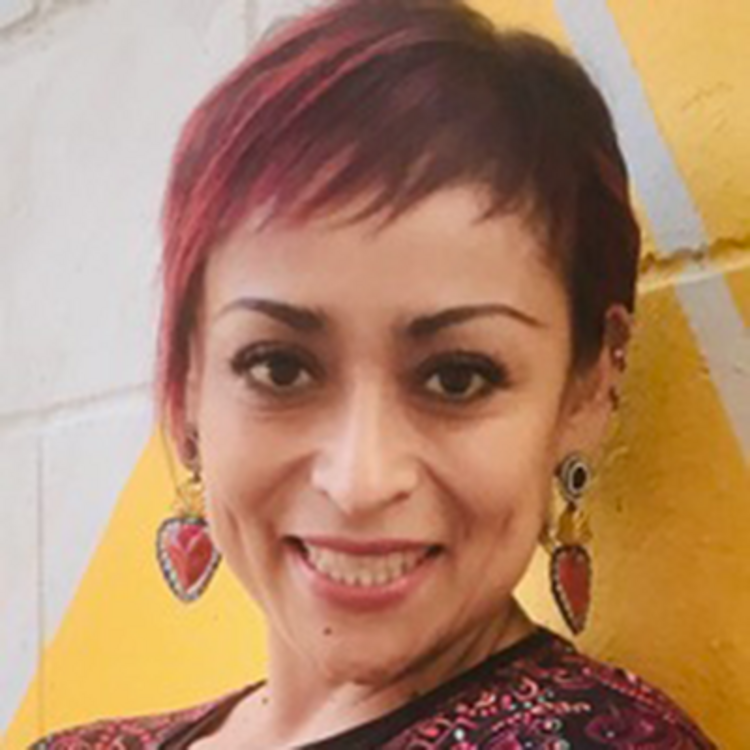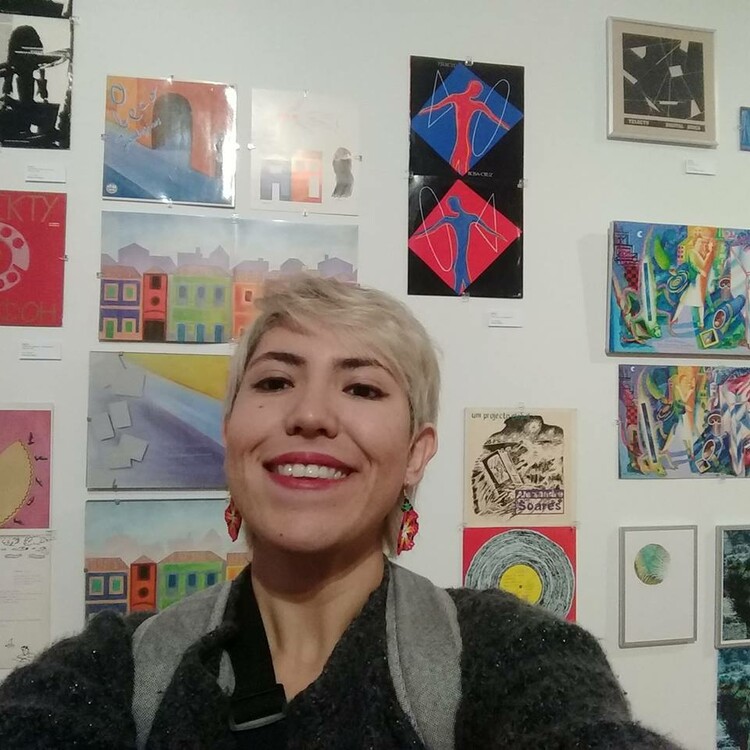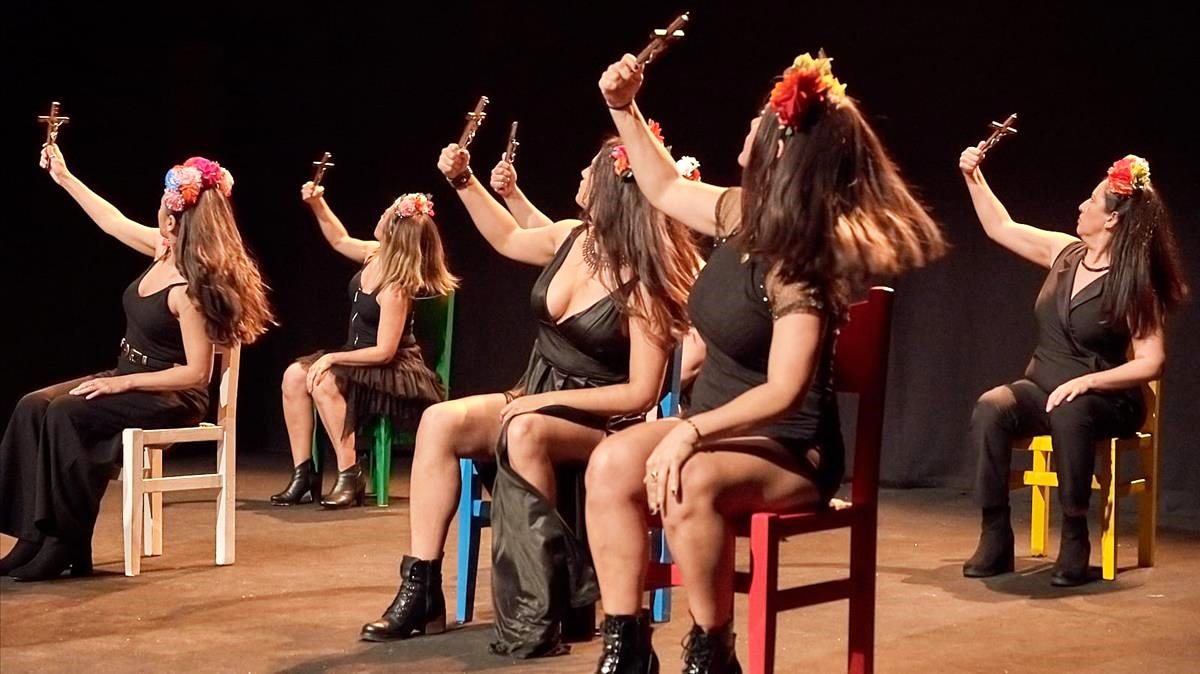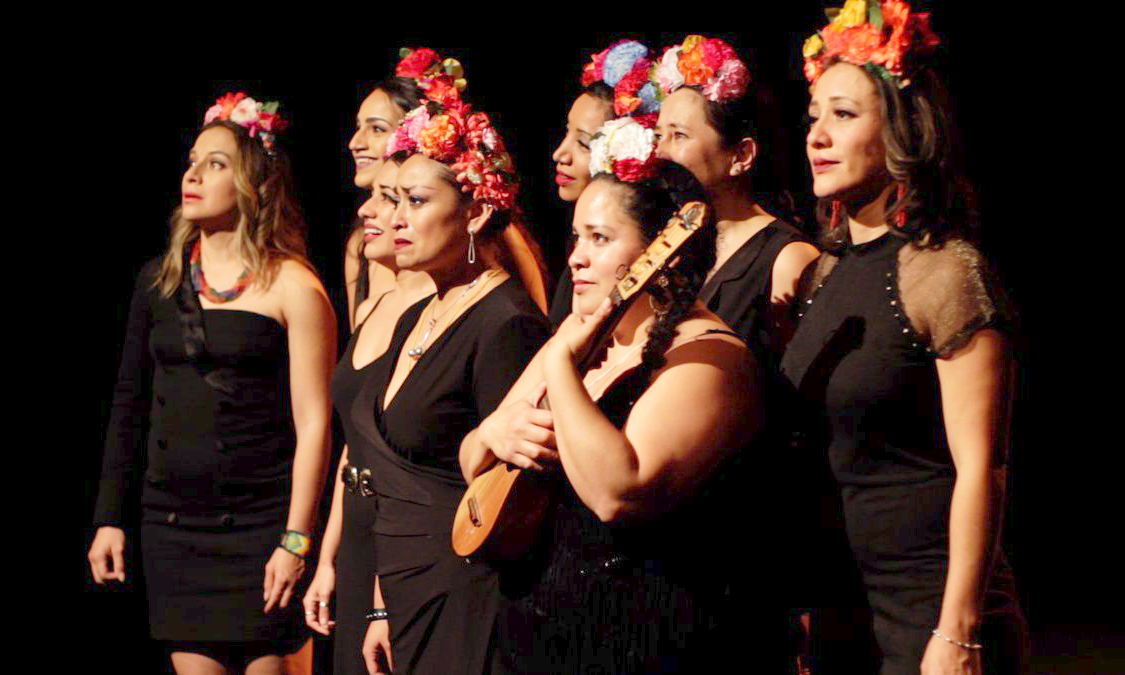Mariela López: Mexicatas me movió mucho porque además de que habla sobre migración, también habla sobre los choques culturales que les suceden a cualquier persona que emigra. En la obra, ustedes hablan sobre Cataluña, donde el idioma principal es el catalán, y sobre México- De donde yo también soy- donde el idioma principal es el español. ¿Cómo fue para ti adaptarte a vivir en Cataluña, a esta sociedad tan diferente a la nuestra?
Ariadna Ferreira: Yo ya había estudiado catalán antes de venir aquí, y yo pensé que algo de eso me iba a ayudar. Pero no es sobre lo que hayas estudiado, es vivir la lengua. Cuando llegue trate de encontrar un piso con personas latinoamericanas porque había escuchado que los catalanes eran súper cerrados. Pero cuando empecé a aprender más sobre las personas catalanas desde otro sentido, bromistas, más abiertas. Empecé a vivir la lengua y la amo. Es hermosa.
Originalmente vine aquí para estudiar un master en teatro en el Institut del Teatre, y en uno de mis primeros días en la Universidad un chico catalán me pregunto: “¿Eres Mexicana?” Y lo le respondí, “Si”, y él me dijo: “Si no hubiera sido por tu país, este país nunca hubiera sido lo que es ahora.” Es la única persona española que me ha dicho algo así. Yo estaba sorprendida, no esperas que un español te hable así, porque ellos son los conquistadores y nosotros los conquistados.
Mariela: Yo también estaría sorprendida si un español me dijera algo así. Yo me fui de México para venir aquí y estudiar un master en arte terapia, porque no hay ninguna forma de estudiar eso en nuestro país. ¿Eso también les paso a tus compañeras actrices? Leí en algunas entrevistas sobre la obra, que la migración de ustedes fue una distancia no deseada- Que ustedes migraron para tener mejores oportunidades de vida, que no pudieron encontrar en México.- Claro que la vida en España es mejor si la comparas con la de nuestro país, pero ¿Cómo crees que fue la migración para ellas?
Ariadna: Mexicatas fue creada por actrices graduados de la Escuela Nacional de Arte Teatral en México. En todos los casos, nosotras venimos a Cataluña por decisión. Algunas ya nos conocíamos, otras no, pero nos empezamos a rastrear porque sabíamos que habíamos estudiado en la misma escuela. Aun aunque fuéramos de diferentes generaciones, nos conocíamos. Y cuando nos empezamos a encontrar aquí en Cataluña, empezamos a considerar la idea de crear algo juntas.
Un día, tuvimos una junta y nos preguntamos a nosotras mismas, ¿Qué hacemos? Queríamos hablar sobre migración pero sabíamos que era un tema un poco agotador. Como mexicanos vivimos con el conocimiento de las “espaldas mojadas”, “el tren bestia”, el sueño americano o quizás el mexicano que es de una ciudad y se va a la capital.
Como migrante mexicana en España, pasando una cuarentena en un país que no es mío, pude sentir por primera vez en dos años un duelo migratorio que nunca antes había experimentado.
Mariela: Es muy importante lo que dices sobre la migración, la cual es una problemática que nos duele a todos los mexicanos de una forma u otra. Es verdad que el concepto de migración en nuestros compatriotas está profundamente arraigado a nuestro país vecino, los Estados Unidos. Todos conocemos a alguien que ha emigrado allá, nacimos con la idea de que la vida es mejor allí, que la mejor opción para nosotros como mexicanos es emigrar a los Estados Unidos, buscar el sueño americano, no importa el cómo. Creo que es peor si naces en el norte de México, como yo, porque vivir cerca de la frontera es sentir el dolor diario de los compatriotas que intentan cruzarla.
La obra abre una ventana diferente para abordar el problema de la migración. Muestra las diferencias culturales entre un país y otro, y el amor que sienten por ambos. Más allá de hablar sobre migración, la obra habla sobre el exilio elegido. Y, como tú dices, las obras sobre migración casi siempre se basan en el dolor o en la tristeza. ¿Se preguntaron entre ustedes otras formas de abordar la problemática de la migración en la obra?
Ariadna: Aquí en Cataluña, tú puedes ver a muchos mexicanos que no les gusta hablar con otros mexicanos. O mexicanos que dicen, “Yo solo salgo con latinoamericanos porque no puedo estar con extranjeros, no encajo.” Nosotras nos intentamos cuestionar ese tipo de cosas. Nos preguntamos cómo había sido nuestra migración, cómo hemos estado viviendo con la cultura catalana y cómo hemos estado viviendo con nuestra cultura mexicana en Cataluña. Pero en algún momento necesitábamos a alguien que pudiera escribir y dirigir todas estas cosas en una obra de teatro.
Mariela: ¿Y por qué no ustedes mismas? Eso me llamó la atención. Ustedes son ocho actrices mexicanas, y es un tema muy personal. En este momento yo estoy escribiendo una obra de teatro junto con otra actriz mexicana sobre la comida de nuestro país y sobre nuestra propia migración, y no puedo imaginar a otra persona dirigiéndola. ¿Por qué buscar a un dramaturgo y a un director?
Ariadna: Para cuando estábamos trabajando en la pieza, todas habíamos estado lejos de México por más de un año, y en algún momento nos dimos cuenta de que nadie nos conocía aquí. Entonces, las otras actrices y yo pensamos: ¿Y si buscáramos un dramaturgo catalán? Podríamos haberle preguntado a cualquiera, porque no teníamos nada que perder. Nos acercamos a Sergi Belbel porque algunas de las chicas ya habían hecho obras de teatro escritas por él y dos de ellas tuvieron las agallas para ir y hablar con él.
Mariela: Que interesante lección para muchos actores y actrices, esta idea de humanizar a los artistas famosos, buscándolos sin nada que perder para preguntarles si a ellos les gustaría trabajar contigo.
Ariadna: Si. Debemos dejar de mitologizarlos, debemos bajarlos de su pedestal. Una cosa es respetarlos y otra creer que son intocables.
Mariela: Y eso pasa mucho en el teatro, ¿Verdad?
Nosotras escribimos escenas y las improvisamos para [Sergi]. Al final le dimos a él todo lo que habíamos escrito y en diez días el trajo para nosotras la obra completa basado en los escritos que le dimos.
Ariadna: Mucho. Nos impresionó mucho que Sergi aceptara, y el trajo a Antonio Calvo para dirigir la obra. En los ensayos, hablamos mucho sobre cómo para cada una de nosotras, nuestra migración fue elegida, todas vinimos aquí porque quisimos, no fue algo que nos obligaron a hacer. Todas somos afortunadas de tener un lugar al cual regresar, pero aun así nuestra migración ha sido dolorosa. Seguimos extrañando a México, a nuestras familias y a nuestros amigos. Nos dolió haber tenido que emigrar a otro país porque no encontramos mejores oportunidades de vida en el nuestro.
Nuestro proceso creativo ocurrió durante dos meses y medio, con Sergi haciéndonos preguntas de ensayo como: ¿Qué palabras se te ocurren cuando piensas en México? ¿Qué pensabas de Cataluña antes de vivir aquí? Y luego escribíamos escenas y las improvisamos para él. Al final le dimos todos nuestros escritos y en diez días nos trajo la obra de teatro basada en lo que le dimos.
Nos reímos mucho porque, por supuesto, comenzamos a magnificar todo lo que nos lleva de regreso a México: veíamos algo mexicano y decíamos: "Sí, extraño mucho esto". Incluso si realmente no nos gusta. Gran parte de nuestro material sobre México llegó en ensayos porque teníamos el punto de vista mexicano, pero necesitábamos un catalán para hablar de Cataluña.
Mariela: Cierto. Ahora entiendo el por qué buscar a un dramaturgo de aquí.
Cuando estábamos tratando de programar esta entrevista, hablamos sobre la mentalidad en torno a la migración del mexicano, que está tan profundamente arraigada a los Estados Unidos. Pero recuerdo que mencionaste la importancia de discutir la migración europea-mexicana, porque somos muchos y muchas las que estamos aquí.
Ariadna: Estábamos ensayando la obra en Cataluña cuando ocurrió el terremoto de la Ciudad de México en 2017, y al día siguiente nos quedamos con este sentimiento malo, que nunca antes habíamos experimentado.
La sensación de no estar allí cuando nuestra familia y amigos nos necesitaban. En ese momento, solo estaba tratando de hablar con mi familia. No podría hacer nada más. Nadie pudo hacer nada. Hay una sensación de impotencia que viene con esto, de estar tan lejos.
Ahora que estamos en cuarentena en España, siempre estamos muy atentos a todas las noticias que están sucediendo en México sobre casos positivos de COVID-19. Con todas las fronteras aéreas españolas cerradas, existe en nosotros esta terrible impotencia de que algo pueda pasarle a nuestras familias y no podremos estar allí, y también viceversa para ellos, ya que España ha sido uno de los países más afectados por La pandemia.





Comments
The article is just the start of the conversation—we want to know what you think about this subject, too! HowlRound is a space for knowledge-sharing, and we welcome spirited, thoughtful, and on-topic dialogue. Find our full comments policy here